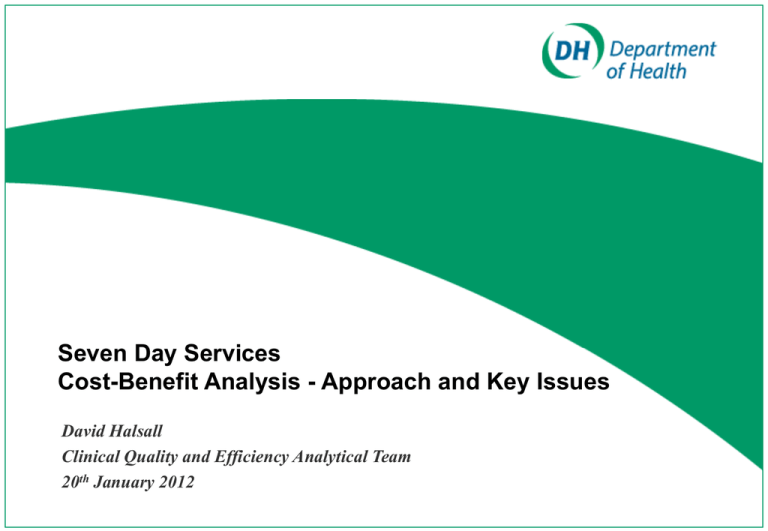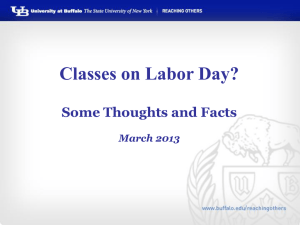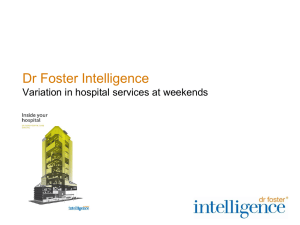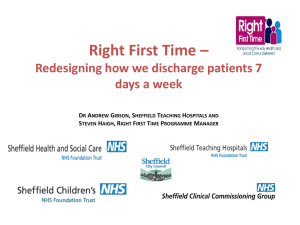Economic analysis of weekend working
advertisement

Seven Day Services Cost-Benefit Analysis - Approach and Key Issues David Halsall Clinical Quality and Efficiency Analytical Team 20th January 2012 Clinical Quality & Efficiency Analytical team Overview • What is economic analysis and how might we frame the problem • Evidence to point us towards were we might find the best cost benefit • An example of how levelling out a service can improve quality to patients, staff and improve cost benefit 2 Clinical Quality & Efficiency Analytical team What sort of economic analysis shall we do? Making the economic case for the reduction the difference between the weekday and weekend level of service requires an evaluation of the costs and benefits of any re-configuration • Economic evaluation in principle is straight forward QALY Health Benefits Extra Cost Cost/benefit QIPP savings Cash savings • Can we show that increasing services at the weekend has – An overall cost benefit? – And is possibly overall cost saving (a QIPP saving) 3 Would we expect incremental changes to resources to have a direct linear link to patient care or would we guess that there is a non-linear relationship ? A conceptual model of the link between access to care and benefits care brings 100 A measure of the benefit care brings For example level of disability following a stroke Clinical Quality & Efficiency Analytical team Looking at benefits 90 Best Practice ? 80 Normal weekday working ? 70 60 50 Weekend Working? 40 30 20 1/3 cost 1/3 cost 1/3 cost 10 0 0 10 20 30 40 50 60 70 80 90 A measure of access to care For example time between admission and senior review 4 Clinical Quality & Efficiency Analytical team How do you eat an elephant? As with any complex problem the trick is to cut it to down to a manageable size… The first thing we do is state what we want to achieve • On the ground of equality and effectiveness a hospital should not unduly delay or otherwise restrict access to services to patients admitted at the weekend compared to those admitted on a weekday. And then we collect evidence to suggest how we best allocate resources to achieve our aim • In this case we can look at the weekend demand and performance measures and see how they compare to a weekday • So what evidence do we have? 5 Fewer people are admitted to hospital as an emergency at the weekend but the chances of dying are noticeably higher National figures, England 2010/11 900 4.1% 800 4.0% 700 3.9% Discharges (000's) Clinical Quality & Efficiency Analytical team Evidence 1 600 500 3.8% 400 3.7% 300 3.6% 200 Emerency admissions 3.5% 100 Percentage who are discharged dead 3.4% MON TUE WED THU Day of admission FRI SAT SUN DH analysis of HES data 2010/11 6 Clinical Quality & Efficiency Analytical team Evidence 2 Or to put it another way the drop in the number of deaths is a lower percentage than the drop in admissions. Could this be a case mix effect? Emergency admission by weekend and weekday admission Change from weekday to weekend admission 15% 10% 5% 0% admissions deaths chance of death -5% -10% -15% -20% -25% DH analysis of HES data 2010/11 7 Stroke, heart failure, some cancers and renal failure seems to make up the biggest contribution to the difference in death rates Acute cerebrovascular disease 6,000 5,000 Weekend mortality Clinical Quality & Efficiency Analytical team Evidence 4 4,000 Congestive heart failure nonhypertensive Cancers* 3,000 2,000 Acute & Unspecified renal failure 1,000 Other lower respiratory diseases Cardiac dysrhythmias - 5,000 10,000 15,000 20,000 Weekend admissions Causes where the difference between mortality rates between weekday and weekend admissions is statistically significant Aylin et al, BMJ Quality & Safety (2010) * Cancer or stomach,, oesophagus, prostate and pancreas. 8 Clinical Quality & Efficiency Analytical team Evidence 4 Admission by specialty shows that general medicine has double the increase of percentage deaths compared to the average weekday to weekend rate. Percentage of patients who are discharged dead by day of the week of admission 7.0% T&O All Specialities Cardiology General Medicine 6.0% 20% 5.0% 4.0% 10% 3.0% 2.0% 1.0% 0.0% MON TUE WED THU FRI SAT SUN DH analysis of HES data 2010/11 9 Clinical Quality & Efficiency Analytical team Example So lets look at an example were extra resources are added to general medicine at the weekend and see if the economic case stacks up • In 2007 Heartland Hospital instigated early consultant review to reduce the risk to patients when AMU patients are transferred to specialist medical wards at weekends. • They replaced weekend on-call “safari” consultant cover with two acute physicians to provide early senior review of newly admitted patients. • This reduced delays in having a clear clinical management plan and reduced LoS for patients admitted towards the end of the week. • In particular it was identified that opportunities were being missed to discharge some patients in the subsequent 24-72 hours after admission • In common with many acute trusts discharges at weekends were less than on weekdays • Seven day working of key clinical and social service staff is required to achieve a levelling out discharge pathways. 10 Clinical Quality & Efficiency Analytical team Example The case can be made that the cost of the extra consultants could be offset but increasing the weekend discharge rate • • • • A consultant (including overheads) could cost £150,000/year A patient awaiting discharge will cost around £250/day So £300,000 is equal to around 1200 patient days Or in other words if 23 patients are discharged 1 day earlier each weekend that would cover the cost of the 2 extra consultants. • In effect one ward would have to be close for a day a week to recover the cost. • The other changes to weekend working patterns are achieved by negotiated HR processes £300,000/year 23 patients a week have their LoS reduced by 1 day 11 Although it is impossible to attribute the improvement in performance to the change in the weekend working pattern it is consistent with what you would expect Percentage of Deaths in Hospital Following Emergency Admission (Birmingham trust and England) 5.0% RR1 2006/07 Weekday = 4.5% Weekend = 5.4% 4.8% Deaths as a percentage of emergency admissions Clinical Quality & Efficiency Analytical team Example +20% 4.6% 4.4% England 2006/07 Weekday = 4.5% Weekend = 4.8% 4.2% +6% England England 2006/07 Weekday = 3.7% +10% Weekend = 4.0% 4.0% Birmingham Heartlands & Solihull NHS Trust (RR1) 3.8% RR1 England 3.6% RR1 20010/11 Weekday = 3.5% +14% Weekend = 3.9% 3.4% 3.2% 3.0% 2005/06 2006/07 2007/08 2008/09 2009/10 2010/11 Source DH analsys - of HES data 12 Clinical Quality & Efficiency Analytical team In addition to the direct costs and benefits there are a range of additional benefits which also could be used to evaluate the change in practice. • • • • Improved patient satisfaction Better training of junior doctors Enhance patient quality and safely Ward staff feel more supported 13 Clinical Quality & Efficiency Analytical team Summary • There is the suggestion that the evening and weekend shutdown of normal service in acute hospitals leaves too many patient in limbo for too long. • With targeted interventions and good HR practices the difference between weekend and weekday service can be reduced showing overall cost benefit. • It is also possible that by keeping the discharge rate close to the weekday rate at the weekend the levelling up the weekend service could be cost saving. 14








